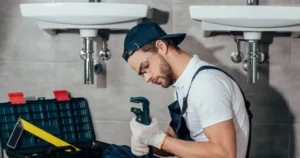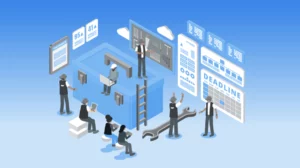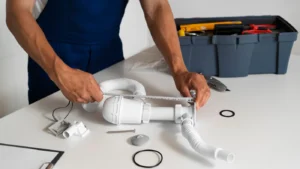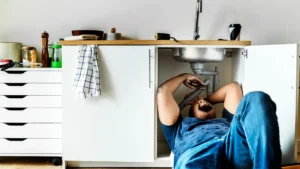Want to win more jobs with less effort?
Grow your business and send quick quotes with our home service software.
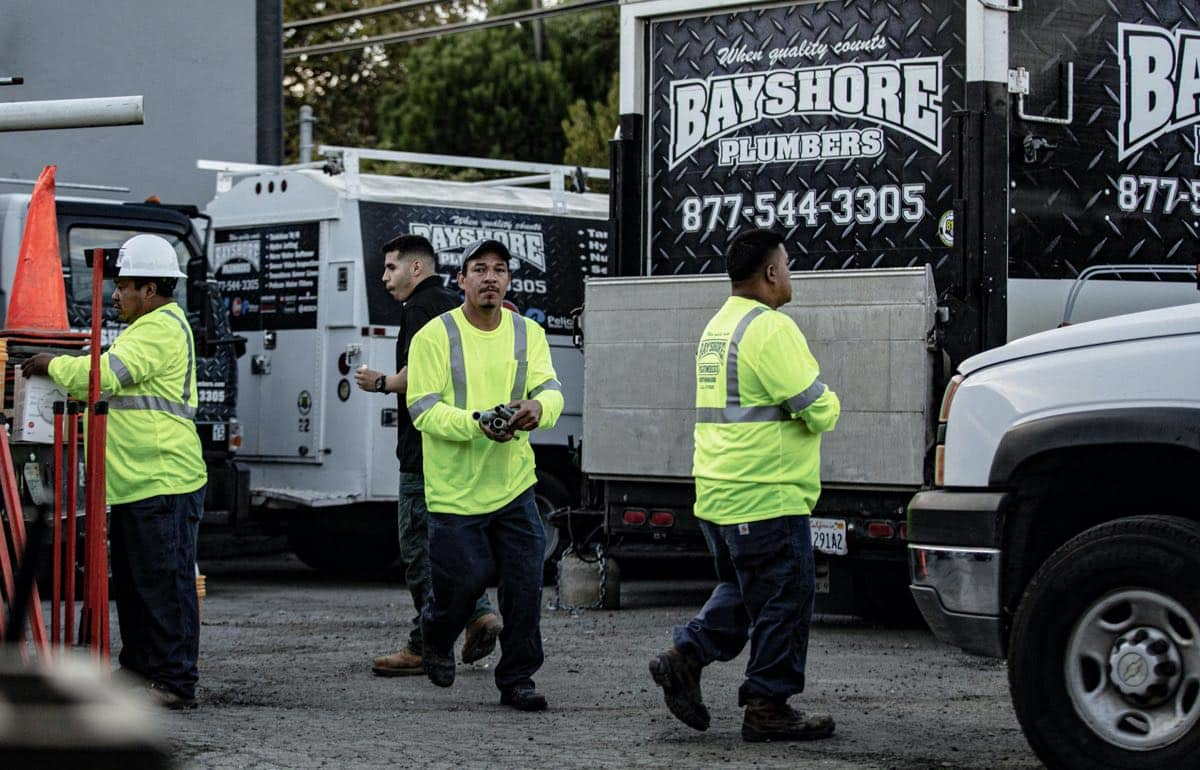
According to the Bureau of Labor Statistics, maintenance workers — including plumbers — experience more injuries and illnesses than almost any other occupation. Fortunately, responsible plumbers can avoid the vast majority of these threats by adhering to plumbing safety tips and using proper protective gear.
Plumber safety tips and how to ensure safety during the pandemic
The ongoing threat of the coronavirus has added new safety risks to the profession and new precautions to take to keep yourself, your team, your customers and your family members safe during this time. We’ll cover the recommendations from the CDC and OSHA concerning safety precautions during the COVID-19 pandemic.
We’ve also included recommendations from our super pros on their favorite personal protective equipment (PPE), such as safety glasses and boots.
But if you’re newer to the industry or looking for a refresher, we recommend reading through our overview of the common hazards and basic safety measures. Make sure everything is covered in your operations manual or employee handbook.
Common hazards and basic safety measures for plumbers
According to the Occupational Safety and Health Administration (OSHA), most injuries — and fatalities — in the plumbing industry result from falling off of ladders and other high locations. If you’ve ever thought such accidents could never happen to you, take a look at this list of recent injuries affecting plumbers, and see if that doesn’t serve as a wake-up call.
Another common hazard plumbers face is the loss of access to adequate levels of oxygen while working in confined spaces. Eye injuries also occur relatively frequently in the plumbing profession, as do illnesses that develop following exposure to mold, asbestos, and raw sewage among other pathogens.
To help you stay out of harm’s way, here are some safety precautions to keep in mind during each stage of a plumbing project.
Before a job
Prior to beginning any job, it’s imperative for plumbing technicians to assess the risks they could potentially confront — regardless of how remote the likelihood of an injury may seem. During this risk assessment, be sure to abide by the following practices.
- Once you’re aware of the job site’s address, look up the appropriate plumbing and building codes to discover more details about the location and what the task entails.
- Do your due diligence to find out if the job site contains mold, asbestos, or lead paint. If any of these hazards are present, ensure to the area is cleaned as best as possible prior to tackling the plumbing problem.
- If you think you’re likely to encounter obstacles you’ve never confronted before, complete any training or certification programs before attempting to resolve the issue.
During a job
Upon arriving at the job site, there may be some serious health concerns that plumbers need to pay attention to. Here are a few such items.
- Given that plumbing systems are generally out of sight, plumbing technicians are often required to operate in confined spaces in awkward positions with little airflow. To make sure you’re not entering an area with toxic fumes or insufficient oxygen, use a portable air monitor to find out if the ambient air is safe.
- Considering that slips and falls are the most common cause of accidents that affect plumbers, use attachment points, harnesses, and certified scaffolding for support when working from high locations, and never attempt an outdoor project if the weather conditions are less than favorable.
- Plumbers are exposed to raw sewage, rodent droppings, and an array of other unpleasant substances on a near-daily basis. Refrain from touching your face while working on such projects, and wash your hands immediately after coming into contact with any substance that seems suspicious.
After a job
Once a plumbing issue is resolved, that doesn’t necessarily mean the job is complete. Before leaving the worksite and returning home, there are a few more precautions responsible plumbers should take to ensure their safety
- Clean up any spills or puddles as soon as possible, and use industrial-grade cleaners and disinfectants to sanitize the space.
- Dispose of any dirty rags rather than reusing them, and wash your work clothes separately than your regular laundry to avoid cross-contamination. If you drive to work, change out of your dirty clothes before stepping back into your vehicle.
- Use antiseptics to thoroughly clean your tools and equipment, and make sure your appliances are always in good working order before using them during any future plumbing projects.
CDC recommendations for PPE during the pandemic
The CDC recommends that employees working in the field should be equipped with alcohol-based hand rubs containing at least 60% alcohol for decontamination and cloth face masks containing two or more layers of fabric. The effectiveness of face shields is still in question.
According to the CDC, gloves are not necessary if you wash your hands frequently.
Van or truck interiors and door handles and any tools used on a job should be cleaned by a list of CDC-approved disinfectants.
Learn more about:
- What to ask when booking service calls during the pandemic.
- Sharing safety protocols with homeowners, how to perform touchless jobs, and other tips.
Other PPE gear every pro should have
Here are some of the most popular types of PPE items along with product recommendations that might be right for you.
Gloves
Although some plumbers prefer not to use gloves because they can hinder dexterity, protecting your hands can keep you safe from cuts, burns, and an assortment of infections. Disposable gloves might be appropriate for certain projects, while fabric or animal-hide gloves generally provide greater protection.
Superpro Suggestion: DEX FIT Nitrile Work Gloves
Coveralls
Coveralls offer a greater level of protection from abrasions, heavy machinery, and caustic chemicals. We also recommend wearing long sleeves which can further prevent your arms from burns and lacerations.
Superpro Suggestion: Tough Duck Overalls
Disinfectant
Rather than relying on everyday household cleaners, industrial disinfectants that target bloodborne pathogens offer a far greater level of protection against various forms of fungi, viruses, and bacteria. Such disinfectants can also be used to decontaminate tools and equipment.
Superpro Suggestion: Cavicide Disintectant
Hard Hat
Although the majority of residential plumbing projects don’t require head protection, falling debris is common during industrial or commercial jobs. A hard hat can save your life if you’re suddenly struck by an object from above.
Superpro Suggestion: Jorestech HDPE Adjustable Hard Hat
Eye Protection
Safety glasses that are fog-resistant and easy to put on and take off dramatically reduce the risk of eye injury from flying projectiles and caustic chemical splashes. Look for eyewear that is durable enough to withstand a significant impact and which won’t shatter when struck by a sharp object.
Superpro Suggestion: NoCry Safety Glasses
Hand Sanitizer
Given that many plumbers are exposed to raw sewage on a regular basis, it’s impossible to overstate the importance of keeping your hands clean. An industrial-grade antiseptic can instantly eliminate any viruses and bacteria you may come into contact with.
Superpro Suggestion: 3M Avagard D Sanitizer Hand Gel
Air Monitors
Not all threats are visible with the naked eye, which is why an air monitor can be a literal lifesaver for plumbing professionals. Avoid oxygen-deficient atmospheres by testing for hydrogen sulfide, sulfur dioxide, and carbon monoxide, which tend to reach unhealthy levels in areas with little to no ventilation.
Superpro Suggestion: Techamor Y201 Portable Air Monitor
Boots
Puddles and standing water can be treacherous, which is why slip-resistant footwear is a must-have for every plumber. Furthermore, caution plumbers can avoid injuries from punctures and falling tools by wearing shoes or boots that have impact-resistant toes and metal insoles.
Superpro Suggestion: Keen Utility Pittsburgh Steel Toe Work Boot
Ear Protection
A report by the World Health Organization found that 48 percent of plumbers experienced hearing loss as a result of working with power tools (such as saws and drills) that create sharp noises and can damage eardrums over time. Earplugs are recommended for any technicians who are exposed to noise levels that exceed 90 decibels for an extended amount of time, while earmuffs offer an even greater level of protection.
Superpro Suggestion: Pro for Sho 34dB Earmuffs
Respirator
Inhalation mold, dust, and asbestos can lead to debilitating diseases that may drastically reduce your life span. For that reason, respirators that filter out such contaminants are recommended when working in old buildings with unknown histories.
Superpro Suggestion: Disposable Dust Mask with Valve N95 Respirator
What to do if an injury occurs
Even plumbers who abide by the industry’s best practices and who wear use appropriate PPE at all times may still fall victim to an on-the-job injury. If the unexpected happens and you find yourself in trouble, obviously it’s important to seek medical attention as soon as possible. However, it’s also important to understand your financial options and know what you’re entitled to in terms of workers’ compensation benefits.
Depending on whether an accident is the result of your own recklessness, your employer’s negligence, or the actions of a third party, you may be eligible to receive compensation for your pain and suffering by filing a civil lawsuit. Plumbing injuries can be exceedingly costly, not to mention they can greatly diminish your quality of life for months, years, or decades to come. If you fall victim to an on-the-job injury, don’t hesitate to contact a personal injury attorney or a lawyer who specializes in workers’ compensation cases to collect what you’re rightfully entitled to.
OSHA plumbing safety manual
Many plumbers who are new to the industry may receive numerous emails or phone calls from salespeople selling OSHA-approved plumbing safety manuals. Oftentimes, such solicitors state that plumbers are required to read and carry these manuals at all times or they could face severe fines. This isn’t entirely true. Many times, plumbers who do purchase such manuals are falling for a scam that’s been around for years. Rather, use safety data sheets (SDS) to stay knowledgeable about health hazards, chemical properties, and PPE recommended for plumbing jobs.


